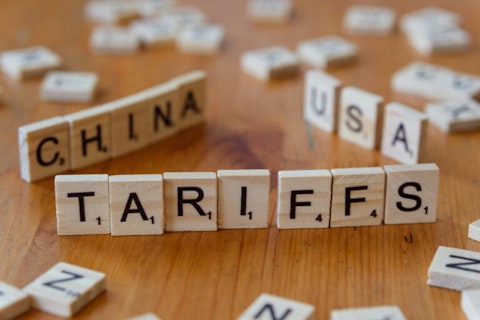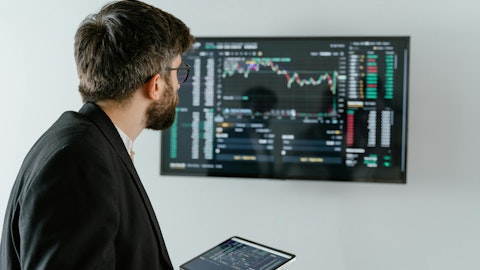The stock market fell sharply anew on Wednesday, with all major indices ending in the red, as investor sentiment was dampened by Federal Chairman Jerome Powell’s bearish comments on the US economy, saying that the US’ tariff policies could drive up inflation and “move us further away from our goals.”
The tech-heavy Nasdaq dropped the hardest, down 3.07 percent. The S&P 500 declined by 2.24 percent, and the Dow Jones was down by 1.73 percent.
Meanwhile, ten companies mirrored a broader market pessimism. In this article, we have detailed the reasons behind their decline.
To come up with the list, we only considered the stocks with $2 billion market capitalization and $5 million trading volume.

Photo by Markus Winkler on Pexels
10. AppLovin Corp. (NASDAQ:APP)
AppLovin Corp. pulled back by 6.38 percent on Wednesday to close at $229.81 apiece as more shareholder law firms are urging investors to join an ongoing class action lawsuit against the company.
In separate statements on Wednesday, a new set of law firms reminded APP shareholders who lost money between May 10, 2023, and February 25, 2025, about the looming deadline to lead as plaintiff for the lawsuit.
According to the lawsuit, APP reported dishonest advertising practices and misleading statements about its business, operations, and prospects concerning financial growth and stability.
The complaint was based on a short seller report on February 26 claiming that APP was reverse engineering and exploiting advertising data from Meta Platforms.
The report further alleged that APP was utilizing manipulative practices to artificially inflate their own ad click-through and app download rates, such as by having ads click on themselves or utilizing design gimmicks to trigger forced shadow downloads, erroneously inflating installation numbers and, in turn, their profit figures.
APP denied any wrongdoing and reassured investors of best practices. It said it had already hired a law firm to investigate the allegations.
9. Nvidia Corp. (NASDAQ:NVDA)
Chip giant Nvidia Corp. declined by 6.87 percent on Wednesday to close at $104.49 apiece as investors sold off positions after announcements that it would take a $5.5-billion financial beating from the US fresh restrictions on the export of its artificial intelligence chips to China.
NVDA fell by more than 10 percent at intra-day trading before buying positions pushed the company’s stock price to end slightly higher.
In a regulatory filing, NVDA said that it was told by the US government on April 9 to require a license to export H20 graphics processing units to China, Hong Kong, Macau, and D:5 countries, among others.
“The USG indicated that the license requirement addresses the risk that the covered products may be used in, or diverted to, a supercomputer in China. On April 14, 2025, the USG informed the company that the license requirement will be in effect for the indefinite future,” NVDA said.
“The company’s first quarter of fiscal year 2026 ends on April 27, 2025. First quarter results are expected to include up to approximately $5.5 billion of charges associated with H20 products for inventory, purchase commitments, and related reserves,” it underscored.
8. Omnicom Group Inc. (NYSE:OMC)
Omnicom Group fell by 7.28 percent on Wednesday to close at $71.24 apiece after the advertising holding firm lowered its organic growth projections this year amid the ongoing market uncertainties.
OMC, which owns agencies such as BBDO, OMD, and TBWA, now expects organic growth to settle between 2.5 percent and 4.5 percent, a reduction from the 3.5 to 4.5 percent range as projected previously.
“As you’re all keenly aware, there’s been increased volatility in the economy and the markets. We’re assessing the implications of these events to determine how they will affect our clients and our business,” said OMC Chief Executive Officer John Wren during the company’s earnings call.
In the first quarter of the year, revenues stood at $3.7 billion, higher by 1.6 percent versus the same period last year.
7. Advanced Micro Devices Inc. (NASDAQ:AMD)
Advanced Micro Devices fell by 7.35 percent on Wednesday to close at $88.29 apiece as investor sentiment was dampened by news that it expects up to $800 million in incurred charges from exporting its MI308 chips to China.
In a regulatory filing, AMD said that it expects to apply for licenses to export, “but there is no assurance that licenses will be granted.”
The new US license requirement, which applies to exports of certain semiconductor products, would hit inventory, purchase commitments, and related reserves.
AMD claims that its MI300 series is “uniquely well-suited to power even the most demanding AI and HPC workloads.” It was said to have generated $25.8 billion in revenues in 2024, but AMD warned that the tariffs could slow growth.
6. The Interpublic Group of Companies, Inc. (NYSE:IPG)
The Interpublic Group of Companies saw its share prices drop by 7.44 percent on Wednesday to end at $23.27 each as investors sold off positions in advertising stocks amid expectations of lower advertising spending.
IPG traded lower alongside its peers, namely APP and OPC, after the latter significantly lowered its growth expectations given the market uncertainties from the ongoing trade tensions between the United States and China.
Further adding to the sentiment were uncertainties on IPG’s looming merger with OMC, which is now being reviewed by the US Federal Trade Commission.
OMC agreed to acquire IPG in December for $13.3 billion. Upon completion, the merger would combine two of the world’s largest advertising groups.
The transaction is expected to generate annual cost synergies of $750 million, and to close in the second half of 2025.
5. Robinhood Markets Inc. (NASDAQ:HOOD)
Robinhood Markets dropped for a second day on Wednesday, losing 7.76 percent to close at $40.66 apiece as investor sentiment was weighed down by Federal Reserve Chairman Jerome Powell’s statement that he expects softer growth for the first quarter of the year.
Powell’s comments were particularly relevant for HOOD, which heavily relies on the huge trading activity to boost revenues. With projected soft first-quarter growth, investors expect that the growth would dampen market trading activities.
In recent news, HOOD said it officially made a foray into the betting market platform by integrating the predictions market hub into its application, which will allow investors to trade on the outcomes of some of the world’s biggest events.
At launch, the hub will allow customers to trade contracts for what the upper bound of the target fed funds rate will be in May, as well as the upcoming men’s and women’s College Basketball Tournaments.
The prediction markets hub and corresponding contracts will initially be available across the US through KalshiEX LLC, a CFTC-regulated exchange.
4. Hims & Hers Health Inc. (NYSE:HIMS)
Telehealth company Hims & Hers dropped its share prices by 8.52 percent on Wednesday to close at $26.95 apiece as investors soured on an investment firm’s conservative rating for the company.
On Wednesday, Bank of America Securities maintained its underperform rating on HIMS but gave the company a price target of $22, an 18-percent downside from the company’s closing price on Wednesday.
According to the brokerage firm, the rating adjustment reflected the company’s slowdown in year-on-year sales growth for March, down 78 percent from the same period a year earlier.
Earlier this year, HIMS saw a spike in sales from the Super Bowl event, but investors are now having doubts about its ability to sustain its momentum following the Food and Drug Administration’s (FDA) announcement that the bestselling Wegovy and Ozempic, manufactured by HIMS’ competitor Novo Nordisk, are back in sufficient supply and now out from the shortage list.
It can be learned that HIMS has been making a compounded knock-off version of the two treatments that propelled its sales over the past few years.
3. Interactive Brokers Group, Inc. (NASDAQ:IBKR)
Interactive Brokers fell by 8.95 percent on Wednesday to end at $157.90 apiece as investors sold off positions on expectations of muted trading activity.
This came after Federal Reserve Chairman Jerome Powell warned on Wednesday of the impact of President Donald Trump’s tariff policies on the US economy, saying that it could inflict lasting economic damage.
“We may find ourselves in the challenging scenario in which our dual-mandate goals are in tension,” Powell said.
The news was particularly relevant for IBKR on expectations that the tariffs’ economic impact could slow down market trading activities.
Additionally, IBKR announced adjusted earnings per share of $1.88, missing analyst estimates. However, its net income expanded by 14.6 percent on a year-on-year basis.
2. ImmunityBio Inc. (NASDAQ:IBRX)
ImmunityBio declined for a second consecutive day on Wednesday, shedding 10.79 percent to close at $2.48 apiece as investors sold off positions amid the broader market decline.
In recent news, IBRX announced that it has completed multiple submissions to the Food and Drug Administration, including a supplemental biologic license application for its novel immunotherapy Anktiva, which aims to treat unresponsive non-muscle invasive bladder cancer carcinoma in situ (CIS).
The company is also underway with the global expansion of Anktiva.
Just recently, it submitted a marketing authorization request to the European Medicines Agency for the review and assessment of the therapy. If approved by the EMA, IBRX would be able to sell ANKTIVA in 27 countries in Europe, including Norway, Iceland, and Liechtenstein.
1. Kingsoft Cloud Holdings Limited (NASDAQ:KC)
Kingsoft Cloud declined for a third straight day on Wednesday, losing 16.82 percent to end at $10.98 apiece as investors disposed of shares in the company following the announcement of a follow-on offer and private placement plans.
According to the company, it plans to offer 18.5 million American depositary shares (ADS) at a price of $11.27 apiece, with each ADS representing 15 ordinary shares.
The total number of ADS translates to 277.5 million ordinary shares.
According to the company, investors have the option to receive ordinary shares to be traded on the Hong Kong Stock Exchange (HKEX) instead of ADSs.
Concurrently, Kingsoft Corporation Ltd., an existing shareholder, is planning to acquire 69.4 million shares through a private placement at the same price as the public offer.
While we acknowledge the potential of KC as an investment, our conviction lies in the belief that AI stocks hold greater promise for delivering higher returns and doing so within a shorter time frame. There is an AI stock that went up since the beginning of 2025, while popular AI stocks lost around 25%. If you are looking for an AI stock that is more promising than KC but that trades at less than 5 times its earnings, check out our report about this cheapest AI stock.
READ NEXT: 20 Best AI Stocks To Buy Now and 30 Best Stocks to Buy Now According to Billionaires.
Disclosure: None. Insider Monkey focuses on uncovering the best investment ideas of hedge funds and insiders. Please subscribe to our free daily e-newsletter to get the latest investment ideas from hedge funds’ investor letters by entering your email address below.





